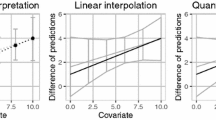Summary
Suppose we have two independent experiments conducted with a set of ‘t’ treatments each, at different places. This paper deals with two interesting problems of testing of hypotheses associated with these experiments. The first problem deals with the test of the equality of the respective treatment effects in the two experiments. The second problem is concerned with the testing of the equality of treatment into places interactions. Though we assume normality, the variance σ 21 in one experiment is assumed different from the variance σ 22 in the other experiment. When no information is available aboutR=σ 21 /(σ 21 +σ 22 ) except that 0≦R≦1, tests known as ‘bilateral tests’ are proposed in the literature, to test the hypotheses mentioned above. This paper studies some important small sample properties of these bilateral tests. More specifically we study the probability of the first and second kind of error of these bilateral tests as a function ofR. When the two experiments have the same number of observations on each treatment, the bilateral test is shown to control the first kind of error. Fort=1,2, the level of these tests is a strictly convex function ofR and hence these tests can be very conservative. Some power properties of these tests are also obtained. Two tests which are equivalent to the bilateral tests for large sample sizes, and which are superior to the bilateral tests for small sample sizes, are obtained.
Similar content being viewed by others
References
Bhat, B. R. and Nagnur, B. N. (1965). Locally asymptotically most stringent tests and Lagarangian multiplier tests of linear hypotheses,Biometrika,52, 459–468.
Buhler, W. J. and Puri, P. S. (1966). On optimal asymptotic tests of composite hypotheses with several constraints,Z. Wahrscheinlichkeits theorie Verw. Geb.,5, 71–88.
Cochran and Cox (1950).Experimental Designs, John Wiley and Sons, Inc., New York.
Kulkarni, S. R. (1969). On the optimal asymptotic tests for the effects of cloud seeding on rainfall (2) the case of variable effects,Australian Journal of Statistics,11, 39–51.
Lehmann, E. L. (1959).Testing Statistical Hypotheses, Wiley, New York.
McGullough, Gurland, J. and Rosenerg, L. (1960). Small sample behaviour of certain tests of the hypothesis of equal means under variance heterogeniety,Biometrika,47, 345–353.
Naik, U. D. (1967). On bilateral and unilateral statistics for tests concerning means of normal populations,Ann. Inst. Statist. Math.,19, 301–312.
Wald, A. (1955). Testing the difference between the means of two normal populations with unknown standard derivations,Selected papers in Statistics and Probability by Abraham Wald, 669–695, McGraw Hill, New York.
Welch, B. L. (1947). The generalisation of Student's problem when several different population variances are involved,Biometrika,34, 28–35.
Author information
Authors and Affiliations
About this article
Cite this article
Kulkarni, S.R. On tests of hypotheses about treatment effects and treatmentX places interactions, in two heteroscedastic experiments. Ann Inst Stat Math 25, 187–203 (1973). https://doi.org/10.1007/BF02479369
Received:
Revised:
Issue Date:
DOI: https://doi.org/10.1007/BF02479369




